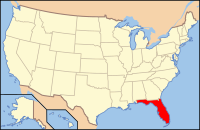Cape Coral-Fort Myers, Florida Metropolitan Statistical Area
| Lee County, Florida | ||
|---|---|---|
|
||
 Location in the U.S. state of Florida |
||
 Florida's location in the U.S. |
||
| Founded | May 13, 1887 | |
| Named for | Robert E. Lee | |
| Seat | Fort Myers | |
| Largest city | Cape Coral | |
| Area | ||
| • Total | 1,212 sq mi (3,139 km2) | |
| • Land | 785 sq mi (2,033 km2) | |
| • Water | 428 sq mi (1,109 km2), 35.3% | |
| Population (est.) | ||
| • (2015) | 701,982 | |
| • Density | 769/sq mi (297.1/km²) | |
| Congressional districts | 17th, 19th | |
| Time zone | Eastern: UTC-5/-4 | |
| Website | www |
|
Lee County is a county in the State of Florida. As of the 2010 census, the population was 618,754. The county seat is Fort Myers, and the largest city is Cape Coral.
Lee County comprises the Cape Coral–Fort Myers, FL Metropolitan Statistical Area.
Lee County was created in 1887 from Monroe County. It was named for Robert E. Lee, Confederate general in the American Civil War.
Incorporated in 1886, Fort Myers is the center of a popular tourist area in Southwest Florida and the seat of Lee County. It is about 120 miles (190 km) south of Tampa at the meeting point of the Gulf of Mexico and the Caloosahatchee River. Fort Myers was the frequent winter home of Thomas Edison, as well as Henry Ford. Lee County has been the host to several Major League Baseball teams for Spring Training, over the past several decades. Currently, it is the spring home of the Boston Red Sox, as well as the Minnesota Twins.
Fort Myers, built in 1850 as a military fort to fend off Seminole Indians, was named after Col. Abraham C. Myers, who was stationed in Florida for seven years and was the son-in-law of the fort’s establisher and commander. In 1858, after years of elusive battle, chief Billy Bowlegs and his warriors were persuaded to surrender and move west, and the fort was abandoned. Billy’s Creek, which flows into the Caloosahatchee River, was named after a temporary camp where Billy Bowlegs and his men awaited ships to take them west.
In 1863, the fort was reoccupied by Federal troops during the Civil War. In 1865 the fort was attacked unsuccessfully by a small group of Confederates. After the war, the fort was again deserted.
...
Wikipedia

